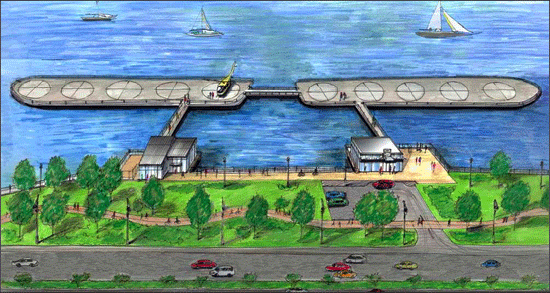By Albert Amateau
In response to a lawsuit by Friends of Hudson River Park demanding that the W. 30th St. Heliport get off parkland on the Hudson River shoreline, Air Pegasus, the heliport operator, has offered to move its helicopter operation to a pair of barges moored about 100 feet west of the shoreline.
The move is proposed by Alvin Trenk, Air Pegasus chairman, as a temporary solution to the issue raised last December in the lawsuit against the Hudson River Park Trust and the heliport operator that the continued operation of the choppers violates state legislation that prohibits a heliport on park property east of the bulkhead, or shoreline.
The barges, which could be up and running in six to 12 months, would operate until the Hudson River Park Trust, the city-state agency in charge of the 5-mile-long riverfront park, finds a new legal site for a heliport through a request for proposals. Among the potential new legal heliport sites is one at the end of Pier 76, which serves as the city auto tow pound opposite the Javits Convention Center at 35th St.
Neighbors and park advocates have long complained that the heliport is too noisy and polluting for a park location, in addition to being illegal on the park property. But the Bloomberg administration has often said that another Manhattan heliport in addition to the Port Authority Heliport on the East River off Wall St. is necessary for business and emergency flights. The West Side Heliport also pays the Trust about $1 million a year for the state permit at 30th St., according to Stefan Freedman, spokesperson for Air Pegasus.
“This is a win-win-win proposal for the park, the city and the vital transportation need,” said Freedman. The barges, connected to the shore at 30th St. by ramps, would be installed entirely at Trenk’s expense, about $2 million. The temporary heliport on barges would accommodate business and emergency flights.
“We’d be willing to discuss the issue of tourism flights with the Friends and the Hudson River Park Trust,” said Freedman.
But Albert Butzel, who was president of the Friends last year when the suit was filed, said any provision near the park for sightseeing helicopter flights would be unacceptable. According to Air Pegasus, sightseeing flights account for 50 percent of the 30th St. Heliport activity, with the other 50 percent being business travel, news media and emergency service.
Daniel Alterman, attorney for the Friends in the suit, responded to the suggestion to move flights to barges by saying, “The park should be free of helicopters as soon as possible. This suggestion is just the result of my clients’ suing Air Pegasus. ”
The lawsuit, filed Dec. 11 by Friends along with park advocates from Lower Manhattan to the Village, Chelsea and Hell’s Kitchen, names the Trust and Liberty Helicopters — a subtenant of Air Pegasus — in addition to Air Pegasus.
Christopher Martin, Trust vice president for public affairs, declined to comment on the Air Pegasus proposal. He said the Trust’s response to the lawsuit would be filed soon.
The Hudson River Park Act of 1998, which created the park and the Trust, permits a heliport in the park, but only as a non-tourist/non-recreation heliport for commercial and emergency transportation. The act also prohibits any heliport being located east — on the land side — of the Hudson River shoreline bulkhead. The heliport is currently on the east side of the bulkhead.
The suit notes that the park’s 1998 environmental impact statement stated that any heliport within the park would have to be west of the bulkhead line — and that no sightseeing helicopter service could be anywhere in the park.
Air Pegasus has been operating the W. 30th St. Heliport under lease for more than 30 years, first under the Port Authority, then under the New York State Department of Transportation and after 1998 “grandfathered” under the Trust, because Air Pegasus had the lease before the Trust was created. But the grandfathered lease expired in 2001.
A holdover provision allows automatic month-to-month renewal but only if Air Pegasus has a five-year contract renewal. There has been no new contract, and the suit notes that the park act requires the Trust to take steps to eliminate any illegal use, like the heliport, from the park.





























